Detailed Analysis of the UK Taxation System and Organizational Impacts
VerifiedAdded on 2022/12/26
|13
|4236
|49
Report
AI Summary
This report provides a detailed analysis of the UK taxation system, comparing it with other countries and highlighting key features. It explores the implications of taxation liabilities for unincorporated organizations, including their advantages and disadvantages, and explains how HMRC assesses and collects taxes. The report further defines incorporated companies, differentiating between public and private organizations, and outlines their tax liabilities. Finally, it evaluates the impact of key legal and ethical constraints on different organizations, offering a comprehensive overview of the UK taxation landscape and its effects on various business structures. The report includes calculations of tax liabilities for individuals and organizations, and it also covers the legal and ethical constraints on different organizations.

Project
1
1
Paraphrase This Document
Need a fresh take? Get an instant paraphrase of this document with our AI Paraphraser
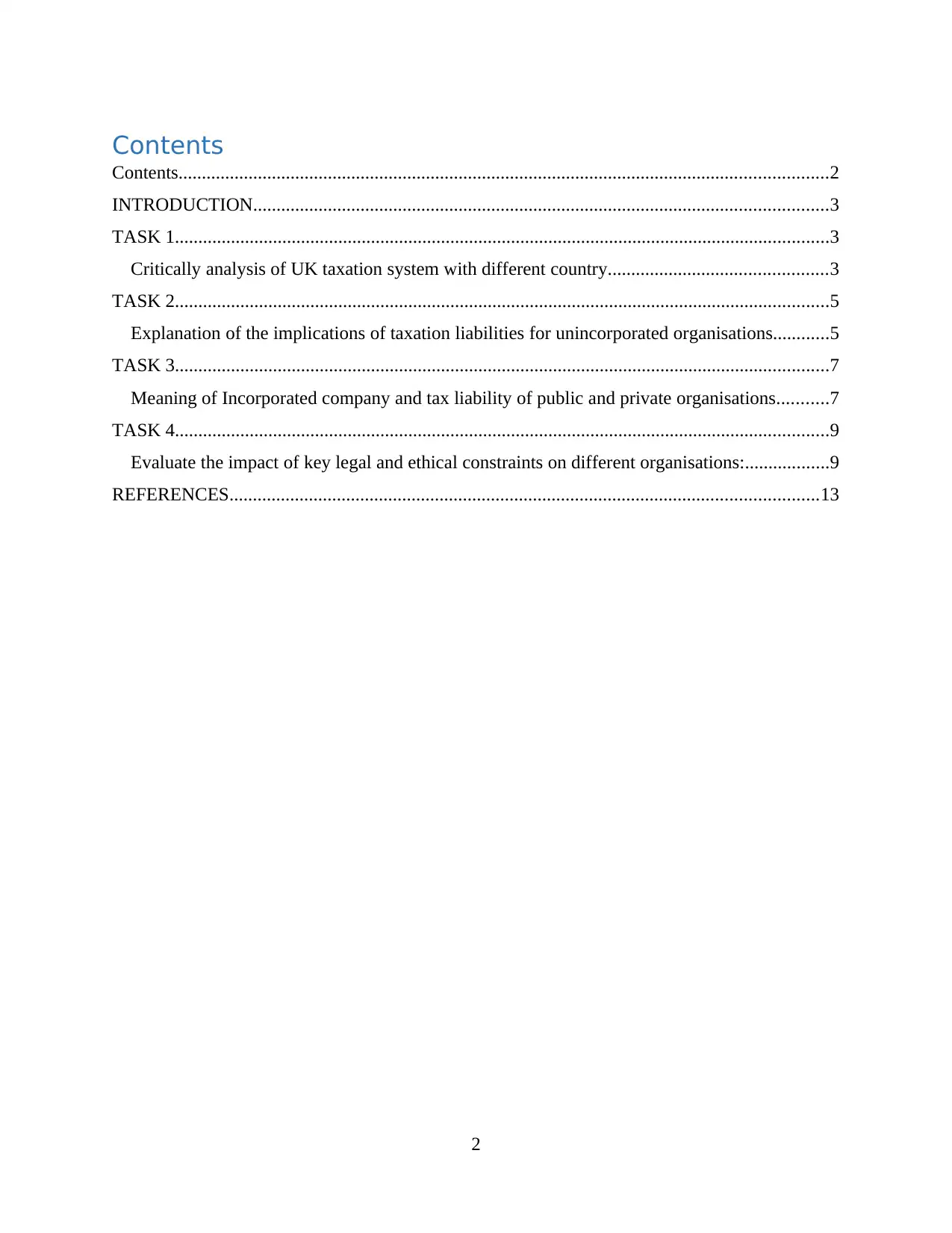
Contents
Contents...........................................................................................................................................2
INTRODUCTION...........................................................................................................................3
TASK 1............................................................................................................................................3
Critically analysis of UK taxation system with different country...............................................3
TASK 2............................................................................................................................................5
Explanation of the implications of taxation liabilities for unincorporated organisations............5
TASK 3............................................................................................................................................7
Meaning of Incorporated company and tax liability of public and private organisations...........7
TASK 4............................................................................................................................................9
Evaluate the impact of key legal and ethical constraints on different organisations:..................9
REFERENCES..............................................................................................................................13
2
Contents...........................................................................................................................................2
INTRODUCTION...........................................................................................................................3
TASK 1............................................................................................................................................3
Critically analysis of UK taxation system with different country...............................................3
TASK 2............................................................................................................................................5
Explanation of the implications of taxation liabilities for unincorporated organisations............5
TASK 3............................................................................................................................................7
Meaning of Incorporated company and tax liability of public and private organisations...........7
TASK 4............................................................................................................................................9
Evaluate the impact of key legal and ethical constraints on different organisations:..................9
REFERENCES..............................................................................................................................13
2
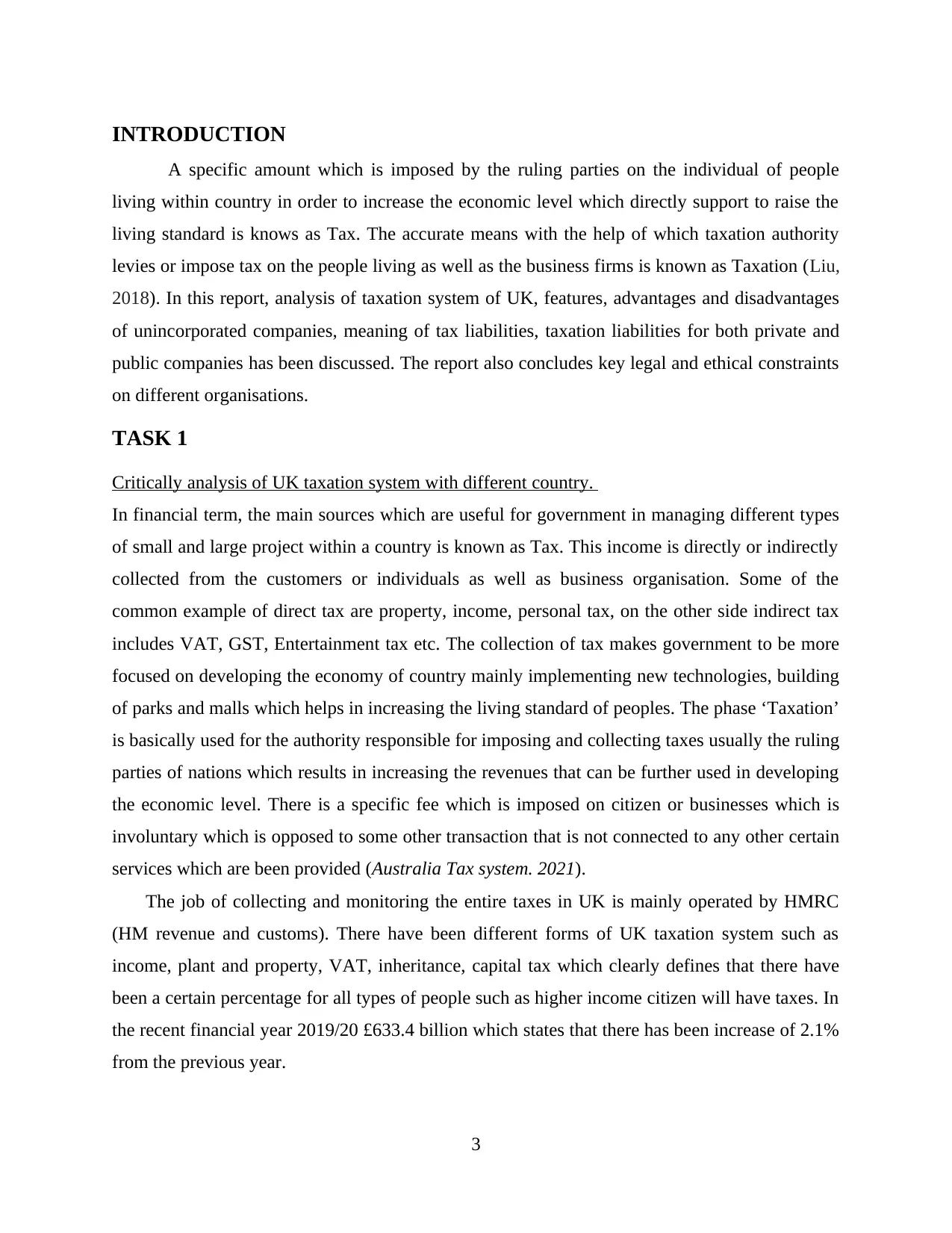
INTRODUCTION
A specific amount which is imposed by the ruling parties on the individual of people
living within country in order to increase the economic level which directly support to raise the
living standard is knows as Tax. The accurate means with the help of which taxation authority
levies or impose tax on the people living as well as the business firms is known as Taxation (Liu,
2018). In this report, analysis of taxation system of UK, features, advantages and disadvantages
of unincorporated companies, meaning of tax liabilities, taxation liabilities for both private and
public companies has been discussed. The report also concludes key legal and ethical constraints
on different organisations.
TASK 1
Critically analysis of UK taxation system with different country.
In financial term, the main sources which are useful for government in managing different types
of small and large project within a country is known as Tax. This income is directly or indirectly
collected from the customers or individuals as well as business organisation. Some of the
common example of direct tax are property, income, personal tax, on the other side indirect tax
includes VAT, GST, Entertainment tax etc. The collection of tax makes government to be more
focused on developing the economy of country mainly implementing new technologies, building
of parks and malls which helps in increasing the living standard of peoples. The phase ‘Taxation’
is basically used for the authority responsible for imposing and collecting taxes usually the ruling
parties of nations which results in increasing the revenues that can be further used in developing
the economic level. There is a specific fee which is imposed on citizen or businesses which is
involuntary which is opposed to some other transaction that is not connected to any other certain
services which are been provided (Australia Tax system. 2021).
The job of collecting and monitoring the entire taxes in UK is mainly operated by HMRC
(HM revenue and customs). There have been different forms of UK taxation system such as
income, plant and property, VAT, inheritance, capital tax which clearly defines that there have
been a certain percentage for all types of people such as higher income citizen will have taxes. In
the recent financial year 2019/20 £633.4 billion which states that there has been increase of 2.1%
from the previous year.
3
A specific amount which is imposed by the ruling parties on the individual of people
living within country in order to increase the economic level which directly support to raise the
living standard is knows as Tax. The accurate means with the help of which taxation authority
levies or impose tax on the people living as well as the business firms is known as Taxation (Liu,
2018). In this report, analysis of taxation system of UK, features, advantages and disadvantages
of unincorporated companies, meaning of tax liabilities, taxation liabilities for both private and
public companies has been discussed. The report also concludes key legal and ethical constraints
on different organisations.
TASK 1
Critically analysis of UK taxation system with different country.
In financial term, the main sources which are useful for government in managing different types
of small and large project within a country is known as Tax. This income is directly or indirectly
collected from the customers or individuals as well as business organisation. Some of the
common example of direct tax are property, income, personal tax, on the other side indirect tax
includes VAT, GST, Entertainment tax etc. The collection of tax makes government to be more
focused on developing the economy of country mainly implementing new technologies, building
of parks and malls which helps in increasing the living standard of peoples. The phase ‘Taxation’
is basically used for the authority responsible for imposing and collecting taxes usually the ruling
parties of nations which results in increasing the revenues that can be further used in developing
the economic level. There is a specific fee which is imposed on citizen or businesses which is
involuntary which is opposed to some other transaction that is not connected to any other certain
services which are been provided (Australia Tax system. 2021).
The job of collecting and monitoring the entire taxes in UK is mainly operated by HMRC
(HM revenue and customs). There have been different forms of UK taxation system such as
income, plant and property, VAT, inheritance, capital tax which clearly defines that there have
been a certain percentage for all types of people such as higher income citizen will have taxes. In
the recent financial year 2019/20 £633.4 billion which states that there has been increase of 2.1%
from the previous year.
3
⊘ This is a preview!⊘
Do you want full access?
Subscribe today to unlock all pages.

Trusted by 1+ million students worldwide
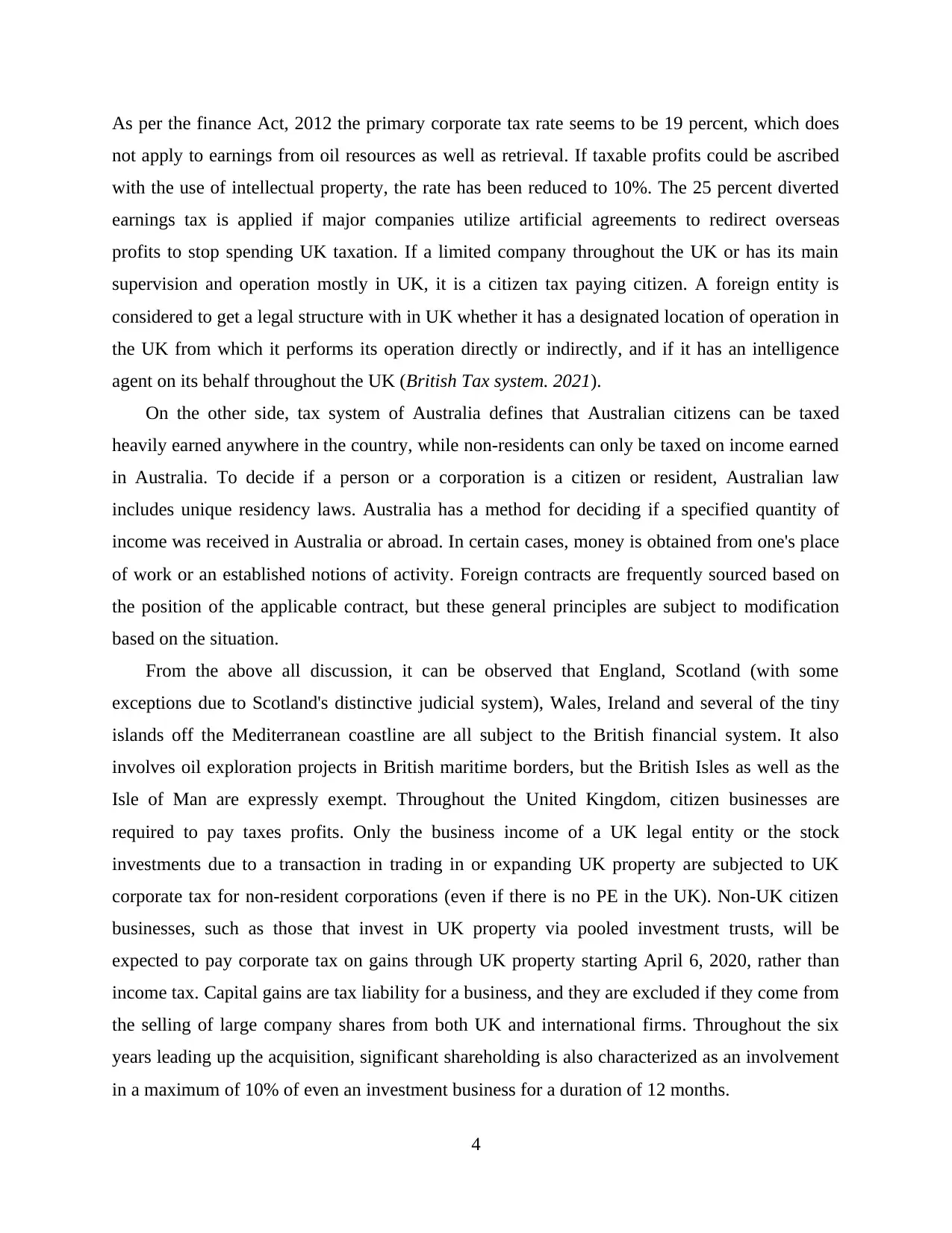
As per the finance Act, 2012 the primary corporate tax rate seems to be 19 percent, which does
not apply to earnings from oil resources as well as retrieval. If taxable profits could be ascribed
with the use of intellectual property, the rate has been reduced to 10%. The 25 percent diverted
earnings tax is applied if major companies utilize artificial agreements to redirect overseas
profits to stop spending UK taxation. If a limited company throughout the UK or has its main
supervision and operation mostly in UK, it is a citizen tax paying citizen. A foreign entity is
considered to get a legal structure with in UK whether it has a designated location of operation in
the UK from which it performs its operation directly or indirectly, and if it has an intelligence
agent on its behalf throughout the UK (British Tax system. 2021).
On the other side, tax system of Australia defines that Australian citizens can be taxed
heavily earned anywhere in the country, while non-residents can only be taxed on income earned
in Australia. To decide if a person or a corporation is a citizen or resident, Australian law
includes unique residency laws. Australia has a method for deciding if a specified quantity of
income was received in Australia or abroad. In certain cases, money is obtained from one's place
of work or an established notions of activity. Foreign contracts are frequently sourced based on
the position of the applicable contract, but these general principles are subject to modification
based on the situation.
From the above all discussion, it can be observed that England, Scotland (with some
exceptions due to Scotland's distinctive judicial system), Wales, Ireland and several of the tiny
islands off the Mediterranean coastline are all subject to the British financial system. It also
involves oil exploration projects in British maritime borders, but the British Isles as well as the
Isle of Man are expressly exempt. Throughout the United Kingdom, citizen businesses are
required to pay taxes profits. Only the business income of a UK legal entity or the stock
investments due to a transaction in trading in or expanding UK property are subjected to UK
corporate tax for non-resident corporations (even if there is no PE in the UK). Non-UK citizen
businesses, such as those that invest in UK property via pooled investment trusts, will be
expected to pay corporate tax on gains through UK property starting April 6, 2020, rather than
income tax. Capital gains are tax liability for a business, and they are excluded if they come from
the selling of large company shares from both UK and international firms. Throughout the six
years leading up the acquisition, significant shareholding is also characterized as an involvement
in a maximum of 10% of even an investment business for a duration of 12 months.
4
not apply to earnings from oil resources as well as retrieval. If taxable profits could be ascribed
with the use of intellectual property, the rate has been reduced to 10%. The 25 percent diverted
earnings tax is applied if major companies utilize artificial agreements to redirect overseas
profits to stop spending UK taxation. If a limited company throughout the UK or has its main
supervision and operation mostly in UK, it is a citizen tax paying citizen. A foreign entity is
considered to get a legal structure with in UK whether it has a designated location of operation in
the UK from which it performs its operation directly or indirectly, and if it has an intelligence
agent on its behalf throughout the UK (British Tax system. 2021).
On the other side, tax system of Australia defines that Australian citizens can be taxed
heavily earned anywhere in the country, while non-residents can only be taxed on income earned
in Australia. To decide if a person or a corporation is a citizen or resident, Australian law
includes unique residency laws. Australia has a method for deciding if a specified quantity of
income was received in Australia or abroad. In certain cases, money is obtained from one's place
of work or an established notions of activity. Foreign contracts are frequently sourced based on
the position of the applicable contract, but these general principles are subject to modification
based on the situation.
From the above all discussion, it can be observed that England, Scotland (with some
exceptions due to Scotland's distinctive judicial system), Wales, Ireland and several of the tiny
islands off the Mediterranean coastline are all subject to the British financial system. It also
involves oil exploration projects in British maritime borders, but the British Isles as well as the
Isle of Man are expressly exempt. Throughout the United Kingdom, citizen businesses are
required to pay taxes profits. Only the business income of a UK legal entity or the stock
investments due to a transaction in trading in or expanding UK property are subjected to UK
corporate tax for non-resident corporations (even if there is no PE in the UK). Non-UK citizen
businesses, such as those that invest in UK property via pooled investment trusts, will be
expected to pay corporate tax on gains through UK property starting April 6, 2020, rather than
income tax. Capital gains are tax liability for a business, and they are excluded if they come from
the selling of large company shares from both UK and international firms. Throughout the six
years leading up the acquisition, significant shareholding is also characterized as an involvement
in a maximum of 10% of even an investment business for a duration of 12 months.
4
Paraphrase This Document
Need a fresh take? Get an instant paraphrase of this document with our AI Paraphraser
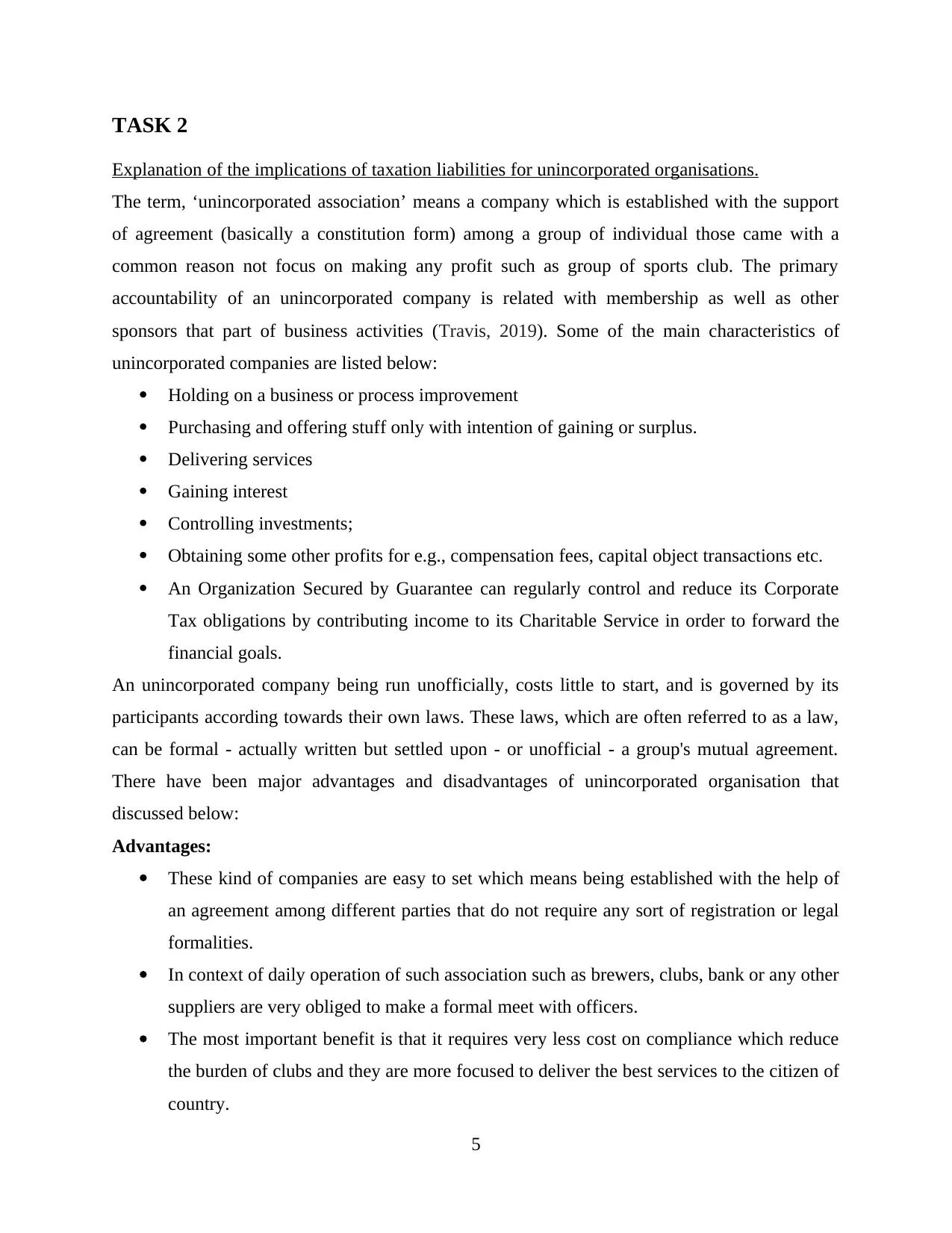
TASK 2
Explanation of the implications of taxation liabilities for unincorporated organisations.
The term, ‘unincorporated association’ means a company which is established with the support
of agreement (basically a constitution form) among a group of individual those came with a
common reason not focus on making any profit such as group of sports club. The primary
accountability of an unincorporated company is related with membership as well as other
sponsors that part of business activities (Travis, 2019). Some of the main characteristics of
unincorporated companies are listed below:
Holding on a business or process improvement
Purchasing and offering stuff only with intention of gaining or surplus.
Delivering services
Gaining interest
Controlling investments;
Obtaining some other profits for e.g., compensation fees, capital object transactions etc.
An Organization Secured by Guarantee can regularly control and reduce its Corporate
Tax obligations by contributing income to its Charitable Service in order to forward the
financial goals.
An unincorporated company being run unofficially, costs little to start, and is governed by its
participants according towards their own laws. These laws, which are often referred to as a law,
can be formal - actually written but settled upon - or unofficial - a group's mutual agreement.
There have been major advantages and disadvantages of unincorporated organisation that
discussed below:
Advantages:
These kind of companies are easy to set which means being established with the help of
an agreement among different parties that do not require any sort of registration or legal
formalities.
In context of daily operation of such association such as brewers, clubs, bank or any other
suppliers are very obliged to make a formal meet with officers.
The most important benefit is that it requires very less cost on compliance which reduce
the burden of clubs and they are more focused to deliver the best services to the citizen of
country.
5
Explanation of the implications of taxation liabilities for unincorporated organisations.
The term, ‘unincorporated association’ means a company which is established with the support
of agreement (basically a constitution form) among a group of individual those came with a
common reason not focus on making any profit such as group of sports club. The primary
accountability of an unincorporated company is related with membership as well as other
sponsors that part of business activities (Travis, 2019). Some of the main characteristics of
unincorporated companies are listed below:
Holding on a business or process improvement
Purchasing and offering stuff only with intention of gaining or surplus.
Delivering services
Gaining interest
Controlling investments;
Obtaining some other profits for e.g., compensation fees, capital object transactions etc.
An Organization Secured by Guarantee can regularly control and reduce its Corporate
Tax obligations by contributing income to its Charitable Service in order to forward the
financial goals.
An unincorporated company being run unofficially, costs little to start, and is governed by its
participants according towards their own laws. These laws, which are often referred to as a law,
can be formal - actually written but settled upon - or unofficial - a group's mutual agreement.
There have been major advantages and disadvantages of unincorporated organisation that
discussed below:
Advantages:
These kind of companies are easy to set which means being established with the help of
an agreement among different parties that do not require any sort of registration or legal
formalities.
In context of daily operation of such association such as brewers, clubs, bank or any other
suppliers are very obliged to make a formal meet with officers.
The most important benefit is that it requires very less cost on compliance which reduce
the burden of clubs and they are more focused to deliver the best services to the citizen of
country.
5
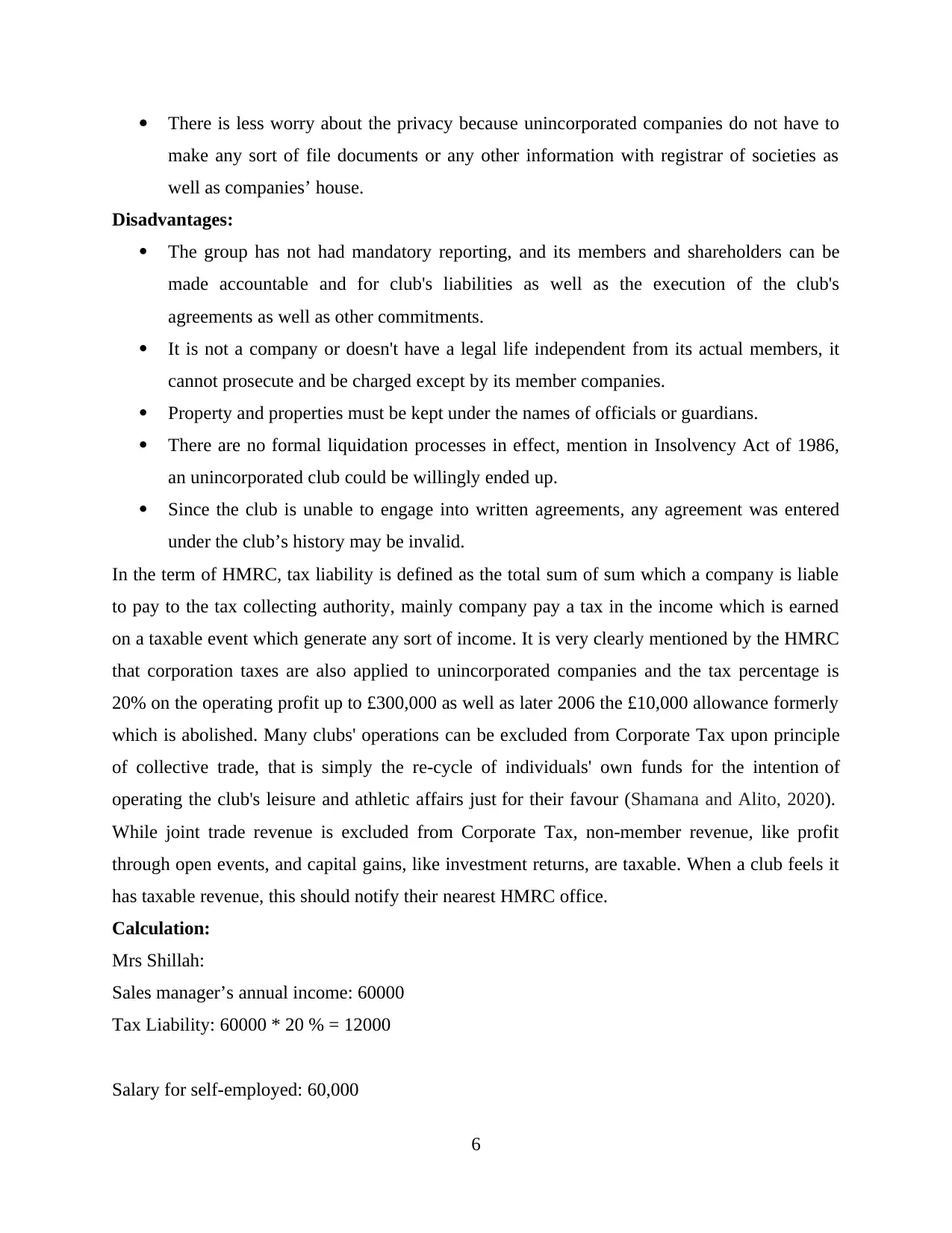
There is less worry about the privacy because unincorporated companies do not have to
make any sort of file documents or any other information with registrar of societies as
well as companies’ house.
Disadvantages:
The group has not had mandatory reporting, and its members and shareholders can be
made accountable and for club's liabilities as well as the execution of the club's
agreements as well as other commitments.
It is not a company or doesn't have a legal life independent from its actual members, it
cannot prosecute and be charged except by its member companies.
Property and properties must be kept under the names of officials or guardians.
There are no formal liquidation processes in effect, mention in Insolvency Act of 1986,
an unincorporated club could be willingly ended up.
Since the club is unable to engage into written agreements, any agreement was entered
under the club’s history may be invalid.
In the term of HMRC, tax liability is defined as the total sum of sum which a company is liable
to pay to the tax collecting authority, mainly company pay a tax in the income which is earned
on a taxable event which generate any sort of income. It is very clearly mentioned by the HMRC
that corporation taxes are also applied to unincorporated companies and the tax percentage is
20% on the operating profit up to £300,000 as well as later 2006 the £10,000 allowance formerly
which is abolished. Many clubs' operations can be excluded from Corporate Tax upon principle
of collective trade, that is simply the re-cycle of individuals' own funds for the intention of
operating the club's leisure and athletic affairs just for their favour (Shamana and Alito, 2020).
While joint trade revenue is excluded from Corporate Tax, non-member revenue, like profit
through open events, and capital gains, like investment returns, are taxable. When a club feels it
has taxable revenue, this should notify their nearest HMRC office.
Calculation:
Mrs Shillah:
Sales manager’s annual income: 60000
Tax Liability: 60000 * 20 % = 12000
Salary for self-employed: 60,000
6
make any sort of file documents or any other information with registrar of societies as
well as companies’ house.
Disadvantages:
The group has not had mandatory reporting, and its members and shareholders can be
made accountable and for club's liabilities as well as the execution of the club's
agreements as well as other commitments.
It is not a company or doesn't have a legal life independent from its actual members, it
cannot prosecute and be charged except by its member companies.
Property and properties must be kept under the names of officials or guardians.
There are no formal liquidation processes in effect, mention in Insolvency Act of 1986,
an unincorporated club could be willingly ended up.
Since the club is unable to engage into written agreements, any agreement was entered
under the club’s history may be invalid.
In the term of HMRC, tax liability is defined as the total sum of sum which a company is liable
to pay to the tax collecting authority, mainly company pay a tax in the income which is earned
on a taxable event which generate any sort of income. It is very clearly mentioned by the HMRC
that corporation taxes are also applied to unincorporated companies and the tax percentage is
20% on the operating profit up to £300,000 as well as later 2006 the £10,000 allowance formerly
which is abolished. Many clubs' operations can be excluded from Corporate Tax upon principle
of collective trade, that is simply the re-cycle of individuals' own funds for the intention of
operating the club's leisure and athletic affairs just for their favour (Shamana and Alito, 2020).
While joint trade revenue is excluded from Corporate Tax, non-member revenue, like profit
through open events, and capital gains, like investment returns, are taxable. When a club feels it
has taxable revenue, this should notify their nearest HMRC office.
Calculation:
Mrs Shillah:
Sales manager’s annual income: 60000
Tax Liability: 60000 * 20 % = 12000
Salary for self-employed: 60,000
6
⊘ This is a preview!⊘
Do you want full access?
Subscribe today to unlock all pages.

Trusted by 1+ million students worldwide
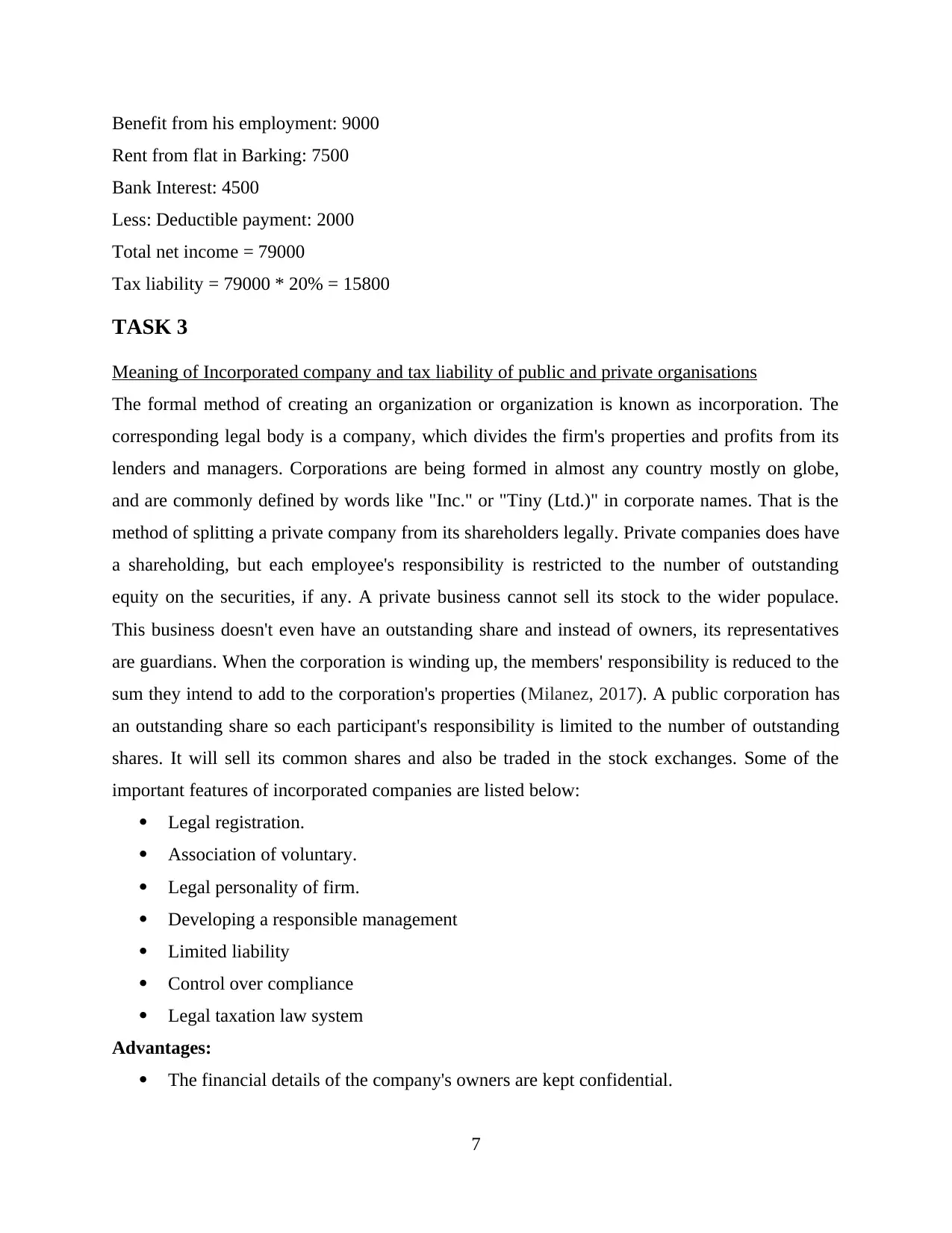
Benefit from his employment: 9000
Rent from flat in Barking: 7500
Bank Interest: 4500
Less: Deductible payment: 2000
Total net income = 79000
Tax liability = 79000 * 20% = 15800
TASK 3
Meaning of Incorporated company and tax liability of public and private organisations
The formal method of creating an organization or organization is known as incorporation. The
corresponding legal body is a company, which divides the firm's properties and profits from its
lenders and managers. Corporations are being formed in almost any country mostly on globe,
and are commonly defined by words like "Inc." or "Tiny (Ltd.)" in corporate names. That is the
method of splitting a private company from its shareholders legally. Private companies does have
a shareholding, but each employee's responsibility is restricted to the number of outstanding
equity on the securities, if any. A private business cannot sell its stock to the wider populace.
This business doesn't even have an outstanding share and instead of owners, its representatives
are guardians. When the corporation is winding up, the members' responsibility is reduced to the
sum they intend to add to the corporation's properties (Milanez, 2017). A public corporation has
an outstanding share so each participant's responsibility is limited to the number of outstanding
shares. It will sell its common shares and also be traded in the stock exchanges. Some of the
important features of incorporated companies are listed below:
Legal registration.
Association of voluntary.
Legal personality of firm.
Developing a responsible management
Limited liability
Control over compliance
Legal taxation law system
Advantages:
The financial details of the company's owners are kept confidential.
7
Rent from flat in Barking: 7500
Bank Interest: 4500
Less: Deductible payment: 2000
Total net income = 79000
Tax liability = 79000 * 20% = 15800
TASK 3
Meaning of Incorporated company and tax liability of public and private organisations
The formal method of creating an organization or organization is known as incorporation. The
corresponding legal body is a company, which divides the firm's properties and profits from its
lenders and managers. Corporations are being formed in almost any country mostly on globe,
and are commonly defined by words like "Inc." or "Tiny (Ltd.)" in corporate names. That is the
method of splitting a private company from its shareholders legally. Private companies does have
a shareholding, but each employee's responsibility is restricted to the number of outstanding
equity on the securities, if any. A private business cannot sell its stock to the wider populace.
This business doesn't even have an outstanding share and instead of owners, its representatives
are guardians. When the corporation is winding up, the members' responsibility is reduced to the
sum they intend to add to the corporation's properties (Milanez, 2017). A public corporation has
an outstanding share so each participant's responsibility is limited to the number of outstanding
shares. It will sell its common shares and also be traded in the stock exchanges. Some of the
important features of incorporated companies are listed below:
Legal registration.
Association of voluntary.
Legal personality of firm.
Developing a responsible management
Limited liability
Control over compliance
Legal taxation law system
Advantages:
The financial details of the company's owners are kept confidential.
7
Paraphrase This Document
Need a fresh take? Get an instant paraphrase of this document with our AI Paraphraser
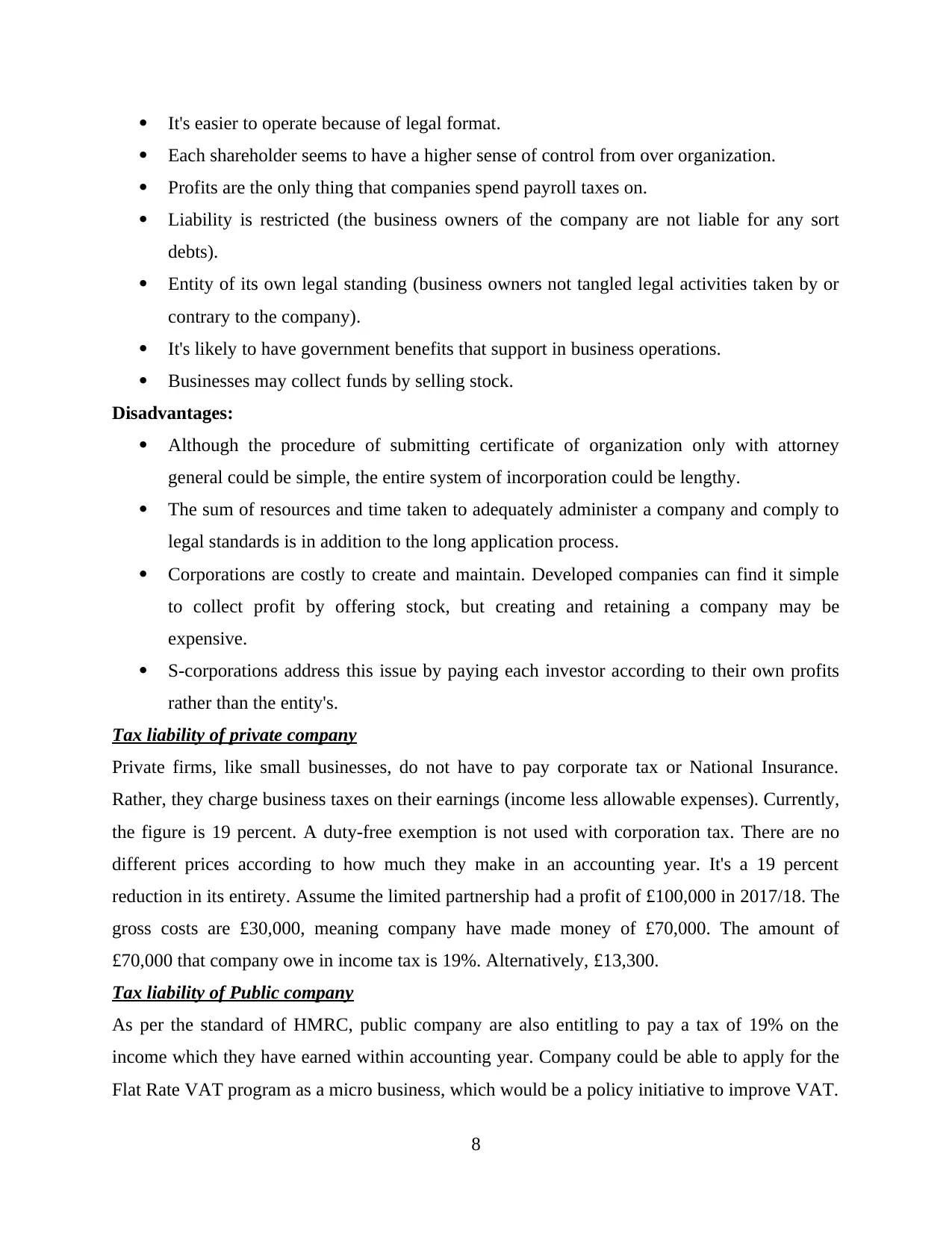
It's easier to operate because of legal format.
Each shareholder seems to have a higher sense of control from over organization.
Profits are the only thing that companies spend payroll taxes on.
Liability is restricted (the business owners of the company are not liable for any sort
debts).
Entity of its own legal standing (business owners not tangled legal activities taken by or
contrary to the company).
It's likely to have government benefits that support in business operations.
Businesses may collect funds by selling stock.
Disadvantages:
Although the procedure of submitting certificate of organization only with attorney
general could be simple, the entire system of incorporation could be lengthy.
The sum of resources and time taken to adequately administer a company and comply to
legal standards is in addition to the long application process.
Corporations are costly to create and maintain. Developed companies can find it simple
to collect profit by offering stock, but creating and retaining a company may be
expensive.
S-corporations address this issue by paying each investor according to their own profits
rather than the entity's.
Tax liability of private company
Private firms, like small businesses, do not have to pay corporate tax or National Insurance.
Rather, they charge business taxes on their earnings (income less allowable expenses). Currently,
the figure is 19 percent. A duty-free exemption is not used with corporation tax. There are no
different prices according to how much they make in an accounting year. It's a 19 percent
reduction in its entirety. Assume the limited partnership had a profit of £100,000 in 2017/18. The
gross costs are £30,000, meaning company have made money of £70,000. The amount of
£70,000 that company owe in income tax is 19%. Alternatively, £13,300.
Tax liability of Public company
As per the standard of HMRC, public company are also entitling to pay a tax of 19% on the
income which they have earned within accounting year. Company could be able to apply for the
Flat Rate VAT program as a micro business, which would be a policy initiative to improve VAT.
8
Each shareholder seems to have a higher sense of control from over organization.
Profits are the only thing that companies spend payroll taxes on.
Liability is restricted (the business owners of the company are not liable for any sort
debts).
Entity of its own legal standing (business owners not tangled legal activities taken by or
contrary to the company).
It's likely to have government benefits that support in business operations.
Businesses may collect funds by selling stock.
Disadvantages:
Although the procedure of submitting certificate of organization only with attorney
general could be simple, the entire system of incorporation could be lengthy.
The sum of resources and time taken to adequately administer a company and comply to
legal standards is in addition to the long application process.
Corporations are costly to create and maintain. Developed companies can find it simple
to collect profit by offering stock, but creating and retaining a company may be
expensive.
S-corporations address this issue by paying each investor according to their own profits
rather than the entity's.
Tax liability of private company
Private firms, like small businesses, do not have to pay corporate tax or National Insurance.
Rather, they charge business taxes on their earnings (income less allowable expenses). Currently,
the figure is 19 percent. A duty-free exemption is not used with corporation tax. There are no
different prices according to how much they make in an accounting year. It's a 19 percent
reduction in its entirety. Assume the limited partnership had a profit of £100,000 in 2017/18. The
gross costs are £30,000, meaning company have made money of £70,000. The amount of
£70,000 that company owe in income tax is 19%. Alternatively, £13,300.
Tax liability of Public company
As per the standard of HMRC, public company are also entitling to pay a tax of 19% on the
income which they have earned within accounting year. Company could be able to apply for the
Flat Rate VAT program as a micro business, which would be a policy initiative to improve VAT.
8
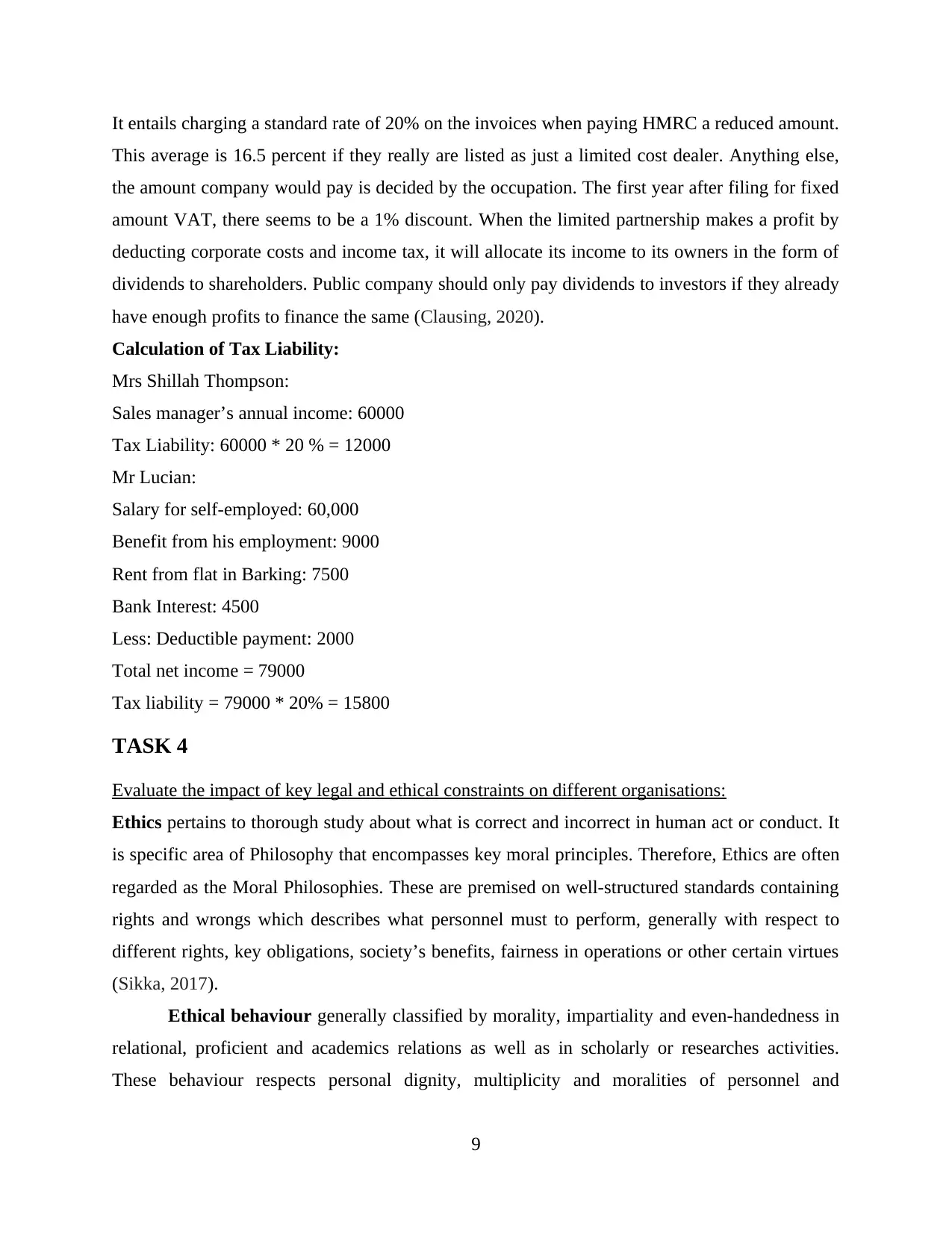
It entails charging a standard rate of 20% on the invoices when paying HMRC a reduced amount.
This average is 16.5 percent if they really are listed as just a limited cost dealer. Anything else,
the amount company would pay is decided by the occupation. The first year after filing for fixed
amount VAT, there seems to be a 1% discount. When the limited partnership makes a profit by
deducting corporate costs and income tax, it will allocate its income to its owners in the form of
dividends to shareholders. Public company should only pay dividends to investors if they already
have enough profits to finance the same (Clausing, 2020).
Calculation of Tax Liability:
Mrs Shillah Thompson:
Sales manager’s annual income: 60000
Tax Liability: 60000 * 20 % = 12000
Mr Lucian:
Salary for self-employed: 60,000
Benefit from his employment: 9000
Rent from flat in Barking: 7500
Bank Interest: 4500
Less: Deductible payment: 2000
Total net income = 79000
Tax liability = 79000 * 20% = 15800
TASK 4
Evaluate the impact of key legal and ethical constraints on different organisations:
Ethics pertains to thorough study about what is correct and incorrect in human act or conduct. It
is specific area of Philosophy that encompasses key moral principles. Therefore, Ethics are often
regarded as the Moral Philosophies. These are premised on well-structured standards containing
rights and wrongs which describes what personnel must to perform, generally with respect to
different rights, key obligations, society’s benefits, fairness in operations or other certain virtues
(Sikka, 2017).
Ethical behaviour generally classified by morality, impartiality and even-handedness in
relational, proficient and academics relations as well as in scholarly or researches activities.
These behaviour respects personal dignity, multiplicity and moralities of personnel and
9
This average is 16.5 percent if they really are listed as just a limited cost dealer. Anything else,
the amount company would pay is decided by the occupation. The first year after filing for fixed
amount VAT, there seems to be a 1% discount. When the limited partnership makes a profit by
deducting corporate costs and income tax, it will allocate its income to its owners in the form of
dividends to shareholders. Public company should only pay dividends to investors if they already
have enough profits to finance the same (Clausing, 2020).
Calculation of Tax Liability:
Mrs Shillah Thompson:
Sales manager’s annual income: 60000
Tax Liability: 60000 * 20 % = 12000
Mr Lucian:
Salary for self-employed: 60,000
Benefit from his employment: 9000
Rent from flat in Barking: 7500
Bank Interest: 4500
Less: Deductible payment: 2000
Total net income = 79000
Tax liability = 79000 * 20% = 15800
TASK 4
Evaluate the impact of key legal and ethical constraints on different organisations:
Ethics pertains to thorough study about what is correct and incorrect in human act or conduct. It
is specific area of Philosophy that encompasses key moral principles. Therefore, Ethics are often
regarded as the Moral Philosophies. These are premised on well-structured standards containing
rights and wrongs which describes what personnel must to perform, generally with respect to
different rights, key obligations, society’s benefits, fairness in operations or other certain virtues
(Sikka, 2017).
Ethical behaviour generally classified by morality, impartiality and even-handedness in
relational, proficient and academics relations as well as in scholarly or researches activities.
These behaviour respects personal dignity, multiplicity and moralities of personnel and
9
⊘ This is a preview!⊘
Do you want full access?
Subscribe today to unlock all pages.

Trusted by 1+ million students worldwide
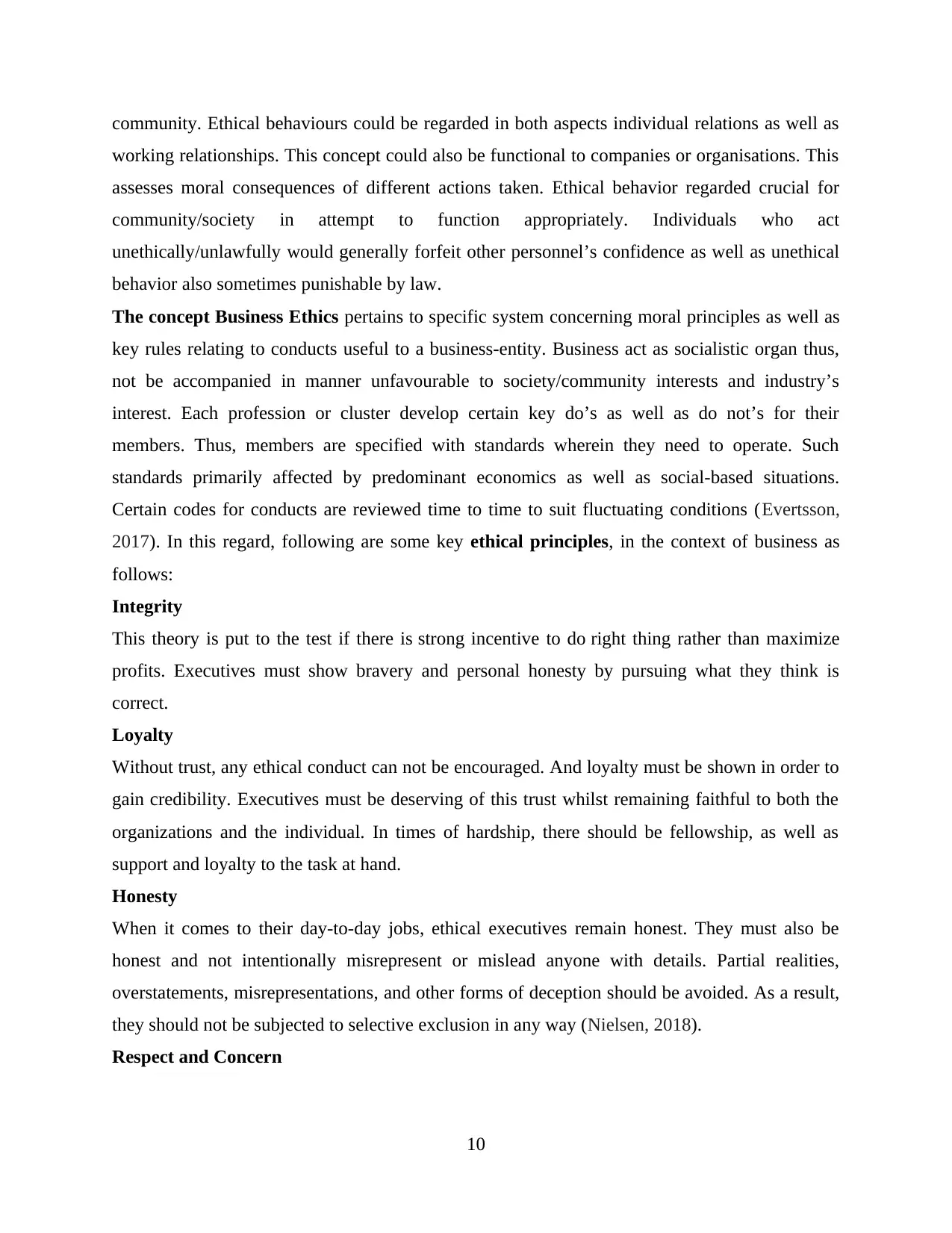
community. Ethical behaviours could be regarded in both aspects individual relations as well as
working relationships. This concept could also be functional to companies or organisations. This
assesses moral consequences of different actions taken. Ethical behavior regarded crucial for
community/society in attempt to function appropriately. Individuals who act
unethically/unlawfully would generally forfeit other personnel’s confidence as well as unethical
behavior also sometimes punishable by law.
The concept Business Ethics pertains to specific system concerning moral principles as well as
key rules relating to conducts useful to a business-entity. Business act as socialistic organ thus,
not be accompanied in manner unfavourable to society/community interests and industry’s
interest. Each profession or cluster develop certain key do’s as well as do not’s for their
members. Thus, members are specified with standards wherein they need to operate. Such
standards primarily affected by predominant economics as well as social-based situations.
Certain codes for conducts are reviewed time to time to suit fluctuating conditions (Evertsson,
2017). In this regard, following are some key ethical principles, in the context of business as
follows:
Integrity
This theory is put to the test if there is strong incentive to do right thing rather than maximize
profits. Executives must show bravery and personal honesty by pursuing what they think is
correct.
Loyalty
Without trust, any ethical conduct can not be encouraged. And loyalty must be shown in order to
gain credibility. Executives must be deserving of this trust whilst remaining faithful to both the
organizations and the individual. In times of hardship, there should be fellowship, as well as
support and loyalty to the task at hand.
Honesty
When it comes to their day-to-day jobs, ethical executives remain honest. They must also be
honest and not intentionally misrepresent or mislead anyone with details. Partial realities,
overstatements, misrepresentations, and other forms of deception should be avoided. As a result,
they should not be subjected to selective exclusion in any way (Nielsen, 2018).
Respect and Concern
10
working relationships. This concept could also be functional to companies or organisations. This
assesses moral consequences of different actions taken. Ethical behavior regarded crucial for
community/society in attempt to function appropriately. Individuals who act
unethically/unlawfully would generally forfeit other personnel’s confidence as well as unethical
behavior also sometimes punishable by law.
The concept Business Ethics pertains to specific system concerning moral principles as well as
key rules relating to conducts useful to a business-entity. Business act as socialistic organ thus,
not be accompanied in manner unfavourable to society/community interests and industry’s
interest. Each profession or cluster develop certain key do’s as well as do not’s for their
members. Thus, members are specified with standards wherein they need to operate. Such
standards primarily affected by predominant economics as well as social-based situations.
Certain codes for conducts are reviewed time to time to suit fluctuating conditions (Evertsson,
2017). In this regard, following are some key ethical principles, in the context of business as
follows:
Integrity
This theory is put to the test if there is strong incentive to do right thing rather than maximize
profits. Executives must show bravery and personal honesty by pursuing what they think is
correct.
Loyalty
Without trust, any ethical conduct can not be encouraged. And loyalty must be shown in order to
gain credibility. Executives must be deserving of this trust whilst remaining faithful to both the
organizations and the individual. In times of hardship, there should be fellowship, as well as
support and loyalty to the task at hand.
Honesty
When it comes to their day-to-day jobs, ethical executives remain honest. They must also be
honest and not intentionally misrepresent or mislead anyone with details. Partial realities,
overstatements, misrepresentations, and other forms of deception should be avoided. As a result,
they should not be subjected to selective exclusion in any way (Nielsen, 2018).
Respect and Concern
10
Paraphrase This Document
Need a fresh take? Get an instant paraphrase of this document with our AI Paraphraser
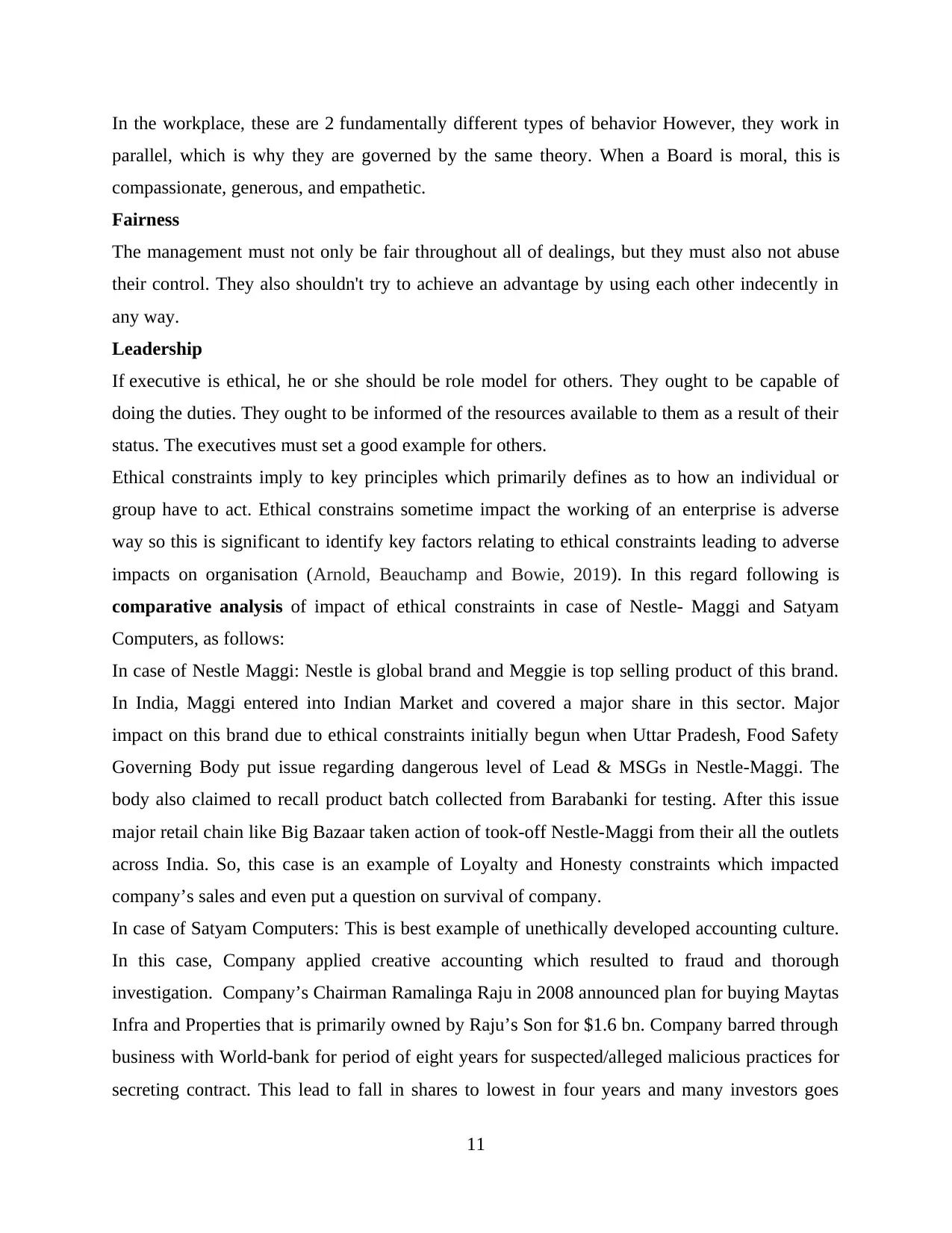
In the workplace, these are 2 fundamentally different types of behavior However, they work in
parallel, which is why they are governed by the same theory. When a Board is moral, this is
compassionate, generous, and empathetic.
Fairness
The management must not only be fair throughout all of dealings, but they must also not abuse
their control. They also shouldn't try to achieve an advantage by using each other indecently in
any way.
Leadership
If executive is ethical, he or she should be role model for others. They ought to be capable of
doing the duties. They ought to be informed of the resources available to them as a result of their
status. The executives must set a good example for others.
Ethical constraints imply to key principles which primarily defines as to how an individual or
group have to act. Ethical constrains sometime impact the working of an enterprise is adverse
way so this is significant to identify key factors relating to ethical constraints leading to adverse
impacts on organisation (Arnold, Beauchamp and Bowie, 2019). In this regard following is
comparative analysis of impact of ethical constraints in case of Nestle- Maggi and Satyam
Computers, as follows:
In case of Nestle Maggi: Nestle is global brand and Meggie is top selling product of this brand.
In India, Maggi entered into Indian Market and covered a major share in this sector. Major
impact on this brand due to ethical constraints initially begun when Uttar Pradesh, Food Safety
Governing Body put issue regarding dangerous level of Lead & MSGs in Nestle-Maggi. The
body also claimed to recall product batch collected from Barabanki for testing. After this issue
major retail chain like Big Bazaar taken action of took-off Nestle-Maggi from their all the outlets
across India. So, this case is an example of Loyalty and Honesty constraints which impacted
company’s sales and even put a question on survival of company.
In case of Satyam Computers: This is best example of unethically developed accounting culture.
In this case, Company applied creative accounting which resulted to fraud and thorough
investigation. Company’s Chairman Ramalinga Raju in 2008 announced plan for buying Maytas
Infra and Properties that is primarily owned by Raju’s Son for $1.6 bn. Company barred through
business with World-bank for period of eight years for suspected/alleged malicious practices for
secreting contract. This lead to fall in shares to lowest in four years and many investors goes
11
parallel, which is why they are governed by the same theory. When a Board is moral, this is
compassionate, generous, and empathetic.
Fairness
The management must not only be fair throughout all of dealings, but they must also not abuse
their control. They also shouldn't try to achieve an advantage by using each other indecently in
any way.
Leadership
If executive is ethical, he or she should be role model for others. They ought to be capable of
doing the duties. They ought to be informed of the resources available to them as a result of their
status. The executives must set a good example for others.
Ethical constraints imply to key principles which primarily defines as to how an individual or
group have to act. Ethical constrains sometime impact the working of an enterprise is adverse
way so this is significant to identify key factors relating to ethical constraints leading to adverse
impacts on organisation (Arnold, Beauchamp and Bowie, 2019). In this regard following is
comparative analysis of impact of ethical constraints in case of Nestle- Maggi and Satyam
Computers, as follows:
In case of Nestle Maggi: Nestle is global brand and Meggie is top selling product of this brand.
In India, Maggi entered into Indian Market and covered a major share in this sector. Major
impact on this brand due to ethical constraints initially begun when Uttar Pradesh, Food Safety
Governing Body put issue regarding dangerous level of Lead & MSGs in Nestle-Maggi. The
body also claimed to recall product batch collected from Barabanki for testing. After this issue
major retail chain like Big Bazaar taken action of took-off Nestle-Maggi from their all the outlets
across India. So, this case is an example of Loyalty and Honesty constraints which impacted
company’s sales and even put a question on survival of company.
In case of Satyam Computers: This is best example of unethically developed accounting culture.
In this case, Company applied creative accounting which resulted to fraud and thorough
investigation. Company’s Chairman Ramalinga Raju in 2008 announced plan for buying Maytas
Infra and Properties that is primarily owned by Raju’s Son for $1.6 bn. Company barred through
business with World-bank for period of eight years for suspected/alleged malicious practices for
secreting contract. This lead to fall in shares to lowest in four years and many investors goes
11
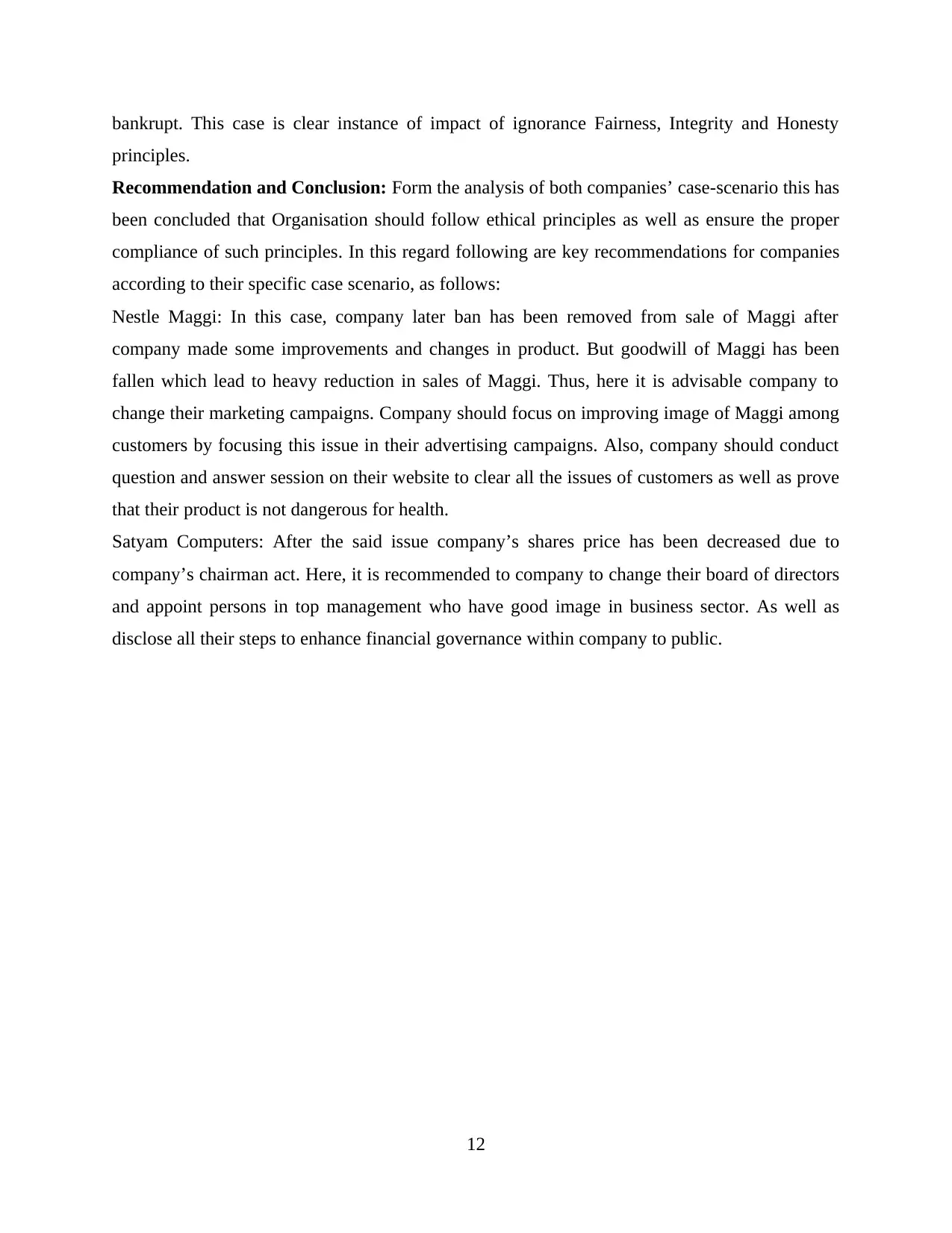
bankrupt. This case is clear instance of impact of ignorance Fairness, Integrity and Honesty
principles.
Recommendation and Conclusion: Form the analysis of both companies’ case-scenario this has
been concluded that Organisation should follow ethical principles as well as ensure the proper
compliance of such principles. In this regard following are key recommendations for companies
according to their specific case scenario, as follows:
Nestle Maggi: In this case, company later ban has been removed from sale of Maggi after
company made some improvements and changes in product. But goodwill of Maggi has been
fallen which lead to heavy reduction in sales of Maggi. Thus, here it is advisable company to
change their marketing campaigns. Company should focus on improving image of Maggi among
customers by focusing this issue in their advertising campaigns. Also, company should conduct
question and answer session on their website to clear all the issues of customers as well as prove
that their product is not dangerous for health.
Satyam Computers: After the said issue company’s shares price has been decreased due to
company’s chairman act. Here, it is recommended to company to change their board of directors
and appoint persons in top management who have good image in business sector. As well as
disclose all their steps to enhance financial governance within company to public.
12
principles.
Recommendation and Conclusion: Form the analysis of both companies’ case-scenario this has
been concluded that Organisation should follow ethical principles as well as ensure the proper
compliance of such principles. In this regard following are key recommendations for companies
according to their specific case scenario, as follows:
Nestle Maggi: In this case, company later ban has been removed from sale of Maggi after
company made some improvements and changes in product. But goodwill of Maggi has been
fallen which lead to heavy reduction in sales of Maggi. Thus, here it is advisable company to
change their marketing campaigns. Company should focus on improving image of Maggi among
customers by focusing this issue in their advertising campaigns. Also, company should conduct
question and answer session on their website to clear all the issues of customers as well as prove
that their product is not dangerous for health.
Satyam Computers: After the said issue company’s shares price has been decreased due to
company’s chairman act. Here, it is recommended to company to change their board of directors
and appoint persons in top management who have good image in business sector. As well as
disclose all their steps to enhance financial governance within company to public.
12
⊘ This is a preview!⊘
Do you want full access?
Subscribe today to unlock all pages.

Trusted by 1+ million students worldwide
1 out of 13
Related Documents
Your All-in-One AI-Powered Toolkit for Academic Success.
+13062052269
info@desklib.com
Available 24*7 on WhatsApp / Email
![[object Object]](/_next/static/media/star-bottom.7253800d.svg)
Unlock your academic potential
Copyright © 2020–2026 A2Z Services. All Rights Reserved. Developed and managed by ZUCOL.





